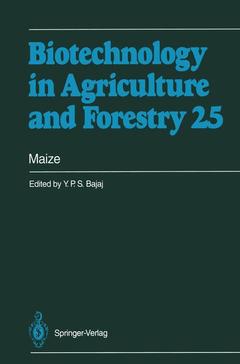Maize, Softcover reprint of the original 1st ed. 1994 Biotechnology in Agriculture and Forestry Series, Vol. 25
Langue : Anglais
Auteur : Bajaj Y. P. S.

Forty chapters deal with various aspects of tissue culture, in vitro manipulation, and other biotechnological approaches to the improvement of maize.
They are arranged in eight sections: - In Vitro Technology, Callus Cultures and Regeneration of Plants, Somatic Embryogenesis. - Wide Hybridization, Embryo, Ovule, and Inflorescence Culture, in Vitro Fertilization. - Production of Haploids and Double Haploids, Anther and Pollen Culture. - Protoplast Culture, Genetic Transformation. - Somaclonal Variation and Mutations. - Molecular Biology and Physiological Studies. - Proteins and Nutritional Improvement. Pollen Storage, Cryopreservation of Germplasm.
They are arranged in eight sections: - In Vitro Technology, Callus Cultures and Regeneration of Plants, Somatic Embryogenesis. - Wide Hybridization, Embryo, Ovule, and Inflorescence Culture, in Vitro Fertilization. - Production of Haploids and Double Haploids, Anther and Pollen Culture. - Protoplast Culture, Genetic Transformation. - Somaclonal Variation and Mutations. - Molecular Biology and Physiological Studies. - Proteins and Nutritional Improvement. Pollen Storage, Cryopreservation of Germplasm.
I.1 Biotechnology in Maize Improvement.- I.2 Establishment of Callus Cultures and Regeneration of Maize Plants.- I.3 Maize Propagation and Breeding Through the Culture of Reproductive Organs.- I.4 Ultrastructural Studies on Callus Development and Somati Embryogenesis in Zea mays L..- II. 1 Maize × Tripsacum Hybridization and the Potential for Apomixis Transfer for Maize Improvement.- II.2 Maize × Teosinte Hybridization.- II.3 Wheat × Maize Crosses for the Production of Wheat Haploids.- II.4Interaction of Callus of Pure Lines and Hybrids of Maize in Co-Culture.- II.5 In Vitro Culture of Maize Inflorescences.- II.6 In Vitro Fertilization in Maize.- III. 1 Anther Culture and Haploid Breeding of Maize in China.- III.2 Embryogenesis in Haploid Cell Culture of Maize.- III.3 Isolated Microspore Culture of Maize.- III.4 Advantages and Disadvantages of the Use of in Vitro/ in Situ Produced DH Maize Plants.- IV. 1 Transformation of Maize Protoplasts.- IV.2 Transformation of Maize Through Particle Bombardment.- IV.3 Transformation in Maize Using Low Voltage electric Current.- V.1 Somaclonal variation in the Progeny of CHI-31 Maize Inbred Line derived from Tissue Culture.- V.2 Insecticide-Resistant Maize Plants Regenerated in Vitro.- V.3 In Vitro Selection for Herbicide Tolerance in Maize.- V.4 In Vitro Selection for Salt Tolerance in Maize.- V.5 Approaches for the Development of Cold Tolerance in Maize Through Regenerable Callus Cultures.- V.6 Cold Tolerance in in Vitro-Grown Seedlings, Callus Tissue, and Somaclones of Maize.- V.7 Genetic variability Induced Through Mutations in Maize.- V.8 C-Banding in Zea mays.- VI. 1 Transposon Tagging Technologies in Maize.- VI.2 Molecular Aspects of Cytoplasmic Male Sterility in Maize.- VI.3 Mitochondrial Genome Organization incmsT-Regenerated Maize Plants.- VI.4 Maize Chloroplast Gene Transfer to Nucleus.- VI.5 Alcohol Dehydrogenases in Maize Cell Cultures.- VI.6 Isozymes as Markers for Embryogenic Maize Callus.- VI.7 Chilling Sensitivity of Photosynthesis in Maize.- VII. 1 Biotechnology in Nutritional Improvement of Maize.- VII.2 Corn Germ Protein: Functional Properties in a Model System and in Food Products.- VII.3 Albumins and Globulins in Maize Grains.- VII.4 Proteins and Amino Acids in Maize Kernels.- VII.5 Synthetic Peptides and Antipeptide Antibodies in Studying Zein Structure and Fingerprinting Maize Genotypes.- VII.6 Alterations in the Biosynthesis of Lysine, Threonine, and Methionine by Tissue Culture Approaches in Maize.- VIII. 1 Preservation of Maize Pollen.- VIII.2 Cryopreservation of Germplasm of Maize.
Date de parution : 10-2012
Ouvrage de 632 p.
15.5x23.5 cm
Thèmes de Maize :
Mots-clés :
Biotechnologie, Pflanzen, Chloroplast, Embryo, Landwirtschaft, Lysin, Maize, Pflanzenzüchtung, agriculture, biotechnology, gene transfer, molecular aspects, plant breeding, protein, seedlings, wheat
© 2024 LAVOISIER S.A.S.



